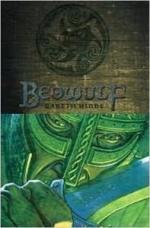{He desires to be held in memory by his people.}
The
wants of the war-thanes; I can wait here no longer.
The
battle-famed bid ye to build them a grave-hill,
50 Bright
when I’m burned, at the brim-current’s
limit;
As
a memory-mark to the men I have governed,
[95] Aloft it shall tower on Whale’s-Ness
uprising,
That
earls of the ocean hereafter may call it
Beowulf’s
barrow, those who barks ever-dashing
55 From
a distance shall drive o’er the darkness of waters.”
{The hero’s last gift}
The
bold-mooded troop-lord took from his neck then
The
ring that was golden, gave to his liegeman,
The
youthful war-hero, his gold-flashing helmet,
His
collar and war-mail, bade him well to enjoy them:
{and last words.}
60 “Thou
art latest left of the line of our kindred,
Of
Waegmunding people: Weird hath offcarried
All
of my kinsmen to the Creator’s glory,
Earls
in their vigor: I shall after them fare.”
’Twas
the aged liegelord’s last-spoken word in
65 His musings
of spirit, ere he mounted the fire,
The
battle-waves burning: from his bosom departed
His
soul to seek the sainted ones’ glory.
[1] The word ‘oferhigian’ (2767) being vague and little understood, two quite distinct translations of this passage have arisen. One takes ‘oferhigian’ as meaning ‘to exceed,’ and, inserting ‘hord’ after ‘gehwone,’ renders: The treasure may easily, the gold in the ground, exceed in value every hoard of man, hide it who will. The other takes ‘oferhigian’ as meaning ‘to render arrogant,’ and, giving the sentence a moralizing tone, renders substantially as in the body of this work. (Cf. 28_13 et seq.)
[2] The passage beginning here is very much disputed. ’The bill of the old lord’ is by some regarded as Beowulf’s sword; by others, as that of the ancient possessor of the hoard. ‘AEr gescod’ (2778), translated in this work as verb and adverb, is by some regarded as a compound participial adj. = sheathed in brass.
XXXIX.
THE DEAD FOES.—WIGLAF’S BITTER TAUNTS.
{Wiglaf is sorely grieved to see his lord look so un-warlike.}
It
had wofully chanced then the youthful retainer
To
behold on earth the most ardent-beloved
At
his life-days’ limit, lying there helpless.
The
slayer too lay there, of life all bereaved,
5
Horrible earth-drake, harassed with sorrow:
{The dragon has plundered his last hoard.}




